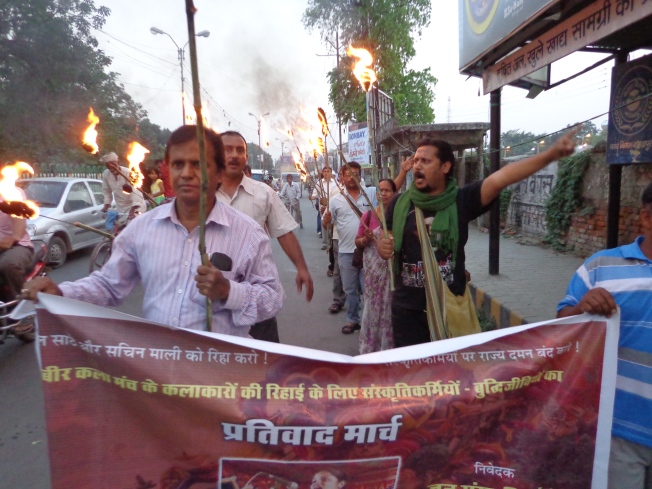Nidhi Surendranath

‘Ideology’ is a word Deepak Dhengle uses frequently when he talks about his life. His ideology changed his life completely in the last few years and landed him in jail in 2011.
Dhengle, who says he subscribes to Marxism and the teachings of B.R. Ambedkar, was arrested by the Maharashtra Anti-Terrorism Squad on charge of associating with Naxalites.
Dhengle, 38, is part of the Pune-based cultural activism group Kabir Kala Manch (KKM), which travels to slums and rural areas of Maharashtra and delivers performances against poverty, caste oppression, and other social issues. Several activists of KKM have been arrested on charge of indoctrinating people into the Naxalite ideology.
Now out on bail, Dhengle was in the city with five other members of KKM to deliver a performance here at the inauguration of a film club. “I have never taken up arms. But the State arrested me under a law that punishes terrorists,” says Dhengle. “We are all democratic people. But we want a true democracy. The Constitution written by Ambedkar should be followed in its true spirit. That is not happening today,” he says.
KKM’s fight, say its members, is against the inequality and minority oppression rampant in India. “There is no electricity and no water in my village outside Pune even today. During the four months of rains, we get electricity only for two hours in the day. There are no good schools. There is a hospital, but no guarantee of getting medicines. Nothing has changed there,” says Dhengle, who works as a mechanic in Pune.
“Pune has one of the most expensive bus systems in the country. How can the poor live in such conditions?” says Rupali Jadhav, a member of KKM.
KKM organises music, poetry and theatre performances in slums and villages on themes such as inequality, illiteracy, price rise, capitalism, and cultural and social oppression. The songs, some of them drawn from the tradition of Dalit protest in Maharashtra and others written by KKM members, deliver their message in simple and direct style. “Our performances come from our folk culture. They tell our audience, primarily tribals and Dalits, about the oppression they face and why such things happen,” says Rupali.
KKM’s musical performances are powerful and draw upon images from the life around them to deliver the message. Their performance was featured in the 2012 documentary Jai Bhim Comrade by award-winning filmmaker Anand Patwardhan. “Our performance is powerful because it is based on our own bitter experiences,” says KKM musician Ramdas Unhale. Ramdas is a carpenter, who like many members of KKM, lives in a Pune slum.
KKM was formed in Pune following the Godhra riots. Dhengle was attracted to the movement in 2004 when he saw and advertisement by the organisation in a newspaper. “I could sing well and I knew I wanted to do something different. So I joined KKM. The ideology came later,” he says.
Others like Rupali and Ramdas joined KKM after seeing their street play and song performances in their slums. Also in Kochi were KKM musicians Rajat R. Avsak, Dattatrey, and Dada Waghmare. All of them do odd jobs in Pune and were drawn into the music and message of the organisation. Despite the arrests, the Kala Manch’s performances are drawing many young people. “The college students who are joining us now already know Marxism. They don’t have to study the ideology first like we did,” says Dhengle. This interest in KKM’s thinking was what prompted the ATS to arrest them, he says. Three of KKM’s members are still in prison, while the others have been let out on bail.
The arrest has hit their lives severely. “We all lost whatever small jobs we were doing. Though we are on bail, we have to report to the investigating agency regularly. That is also affecting our jobs,” says Rupali.
The organisation, however, has managed to keep going. KKM recently performed in Bangalore, with Dattatrey even performing a song in Kannada. Having arrived in Kerala for the first time, the group is disappointed by what they saw here.
“We had high hopes when we were coming here. We heard that Kerala had a strong Communist movement and that women were empowered here. But the myth is now broken,” says Dhengle. “For land so rich in natural resources, the situation is not much better here. Why have the Communists here not done anything? What will I go back and tell all those people who hold Kerala in high regard?” he says.
For now, the members of Kabir Kala Manch will go back with these questions and find ways to fortify their own movement.






 A dance performance choreographed by Mishti Bawar, set to KKM songs
A dance performance choreographed by Mishti Bawar, set to KKM songs


 Anand Pathwardhan and the four accused contemplate their next move after being shooed away from Mantralaya on May 6 |Photos: Kashish Parpiani
Anand Pathwardhan and the four accused contemplate their next move after being shooed away from Mantralaya on May 6 |Photos: Kashish Parpiani
 Mumbai Social ‘Raptivist A-List is back on your speakers with a new joint called ‘Free
Mumbai Social ‘Raptivist A-List is back on your speakers with a new joint called ‘Free